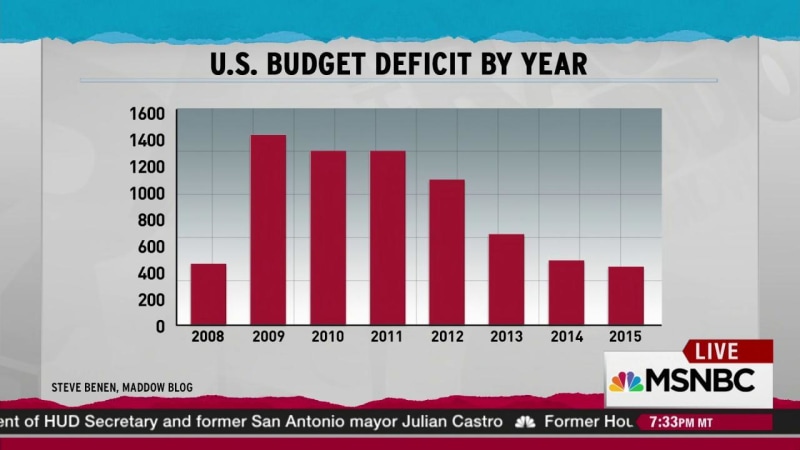

In the not-too-distant past, talk in the political world of the U.S. budget deficit was all the rage. As the Tea Party “movement” took shape, conservatives quite literally took to the streets to express their fear that President Obama and Democrats were failing to address the “out of control” deficit.
Congressional Republicans agreed. As recently as 2013, Sen. Rand Paul (R-Ky.) was asked about the radicalism of his political agenda and he responded, “[W]hat I would say is extreme is a trillion-dollar deficit every year.” Around the same time, then-House Majority Leader Eric Cantor (R-Va.) argued that Congress should be “focused on trying to deal with the ultimate problem, which is this growing deficit.”
The Republican rhetoric was ridiculously wrong. We don’t have a trillion-dollar deficit; the deficit isn’t the ultimate problem; and it’s not growing.
Strong growth in individual tax collection drove the U.S. budget deficit to a fresh Obama-era low in fiscal 2015, the Treasury Department said Thursday.For the fiscal year that ended Sept. 30 the shortfall was $439 billion, a decrease of 9%, or $44 billion, from last year. The deficit is the smallest of Barack Obama’s presidency and the lowest since 2007 in both dollar terms and as a percentage of gross domestic product.
Keep in mind, in the Obama era, the deficit has shrunk by $1 trillion. That’s “trillion,” with a “t.” As a percentage of the economy, the deficit is now down to just 2.5%, which is below the average of the past half-century, and down from 9.8% when the president took office.
Revisiting our coverage from several months ago, I looked for press releases from the “Obama is turning us into Greece!” crowd, eager to see them celebrate President Obama’s striking record on deficit reduction, but so far, nothing has turned up. Maybe they’re busy.
And in practical terms, that’s a shame. The vast majority of Americans are absolutely certain – thanks to deceptive Republican rhetoric and unfortunate news coverage – that the deficit has soared in the Obama era. Late last year, a Bloomberg Politics Poll found that 73% of the public believes the deficit has gotten bigger over the last six years.
The year before, the same pollster found that only 6% of Americans realized the deficit was shrinking. It helps explain why the president hasn’t gotten any credit for deficit reduction, which seems like the sort of development Tea Partiers and the Beltway’s Very Serious People should consider an extraordinary accomplishment.
And in practical terms, that’s a shame. The vast majority of Americans are absolutely certain – thanks to deceptive Republican rhetoric and unfortunate news coverage – that the deficit has soared in the Obama era. Late last year, a Bloomberg Politics Poll found that 73% of the public believes the deficit has gotten bigger over the last six years.
The year before, the same pollster found that only 6% of Americans realized the deficit was shrinking. It helps explain why the president hasn’t gotten any credit for deficit reduction, which seems like the sort of development Tea Partiers and the Beltway’s Very Serious People should consider an extraordinary accomplishment.
As we talked about last year, it’s tempting to conclude that the public’s confusion doesn’t matter. In the Clinton era, the deficit disappeared entirely, and Americans had no idea.
But there’s another side to this. Whether or not Americans know and/or understand the basics of the fiscal argument may not have a practical impact on the debate itself, but the fact remains that voters are ultimately responsible for electing policymakers. If Americans believe, incorrectly, that the deficit is getting bigger, these same voters may be inclined to vote for candidates who’ll slash public investments and undermine social-insurance programs – which would have real-world consequences.
Postscript: To reiterate a point that bears repeating, I don’t necessarily consider this sharp reduction in the deficit to be good news. If it were up to me, federal officials would be borrowing more, not less, taking advantage of low interest rates, investing heavily in infrastructure and economic development, creating millions of jobs, and leaving deficit reduction for another day.
That said, if we’re going to have a fiscal debate, it should at least be rooted in reality, not silly misconceptions. And the reality is, we’re witnessing deficit reduction at a truly remarkable clip. Every conservative complaint about fiscal recklessness and irresponsibility in the Obama era is quantifiably ridiculous.

No comments:
Post a Comment